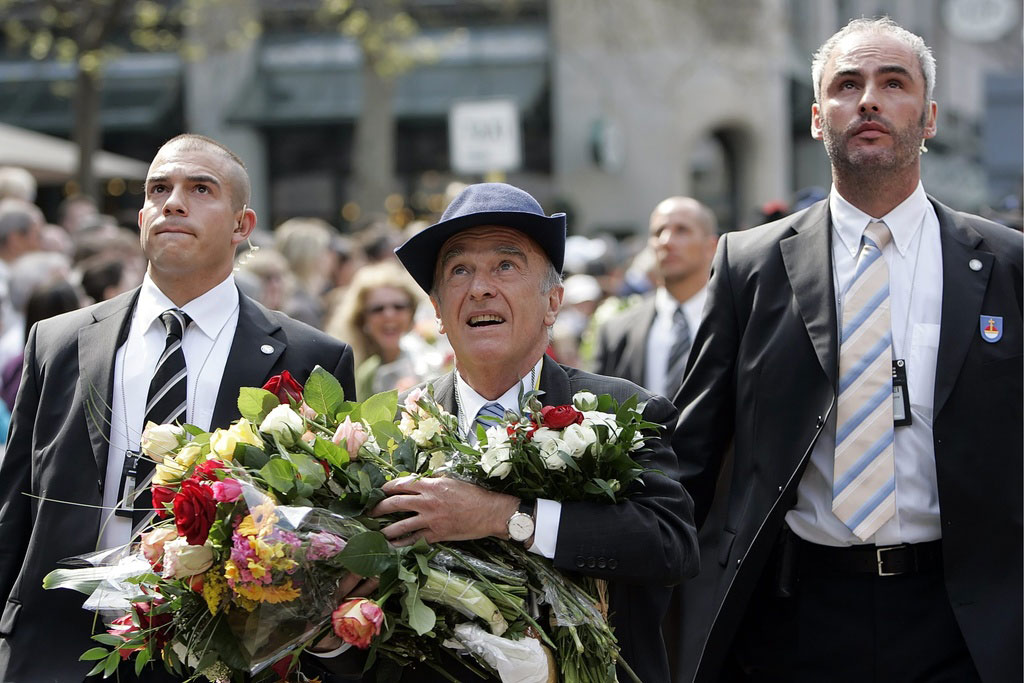
Safety does not worry low-key Swiss politicians

Italian Premier Silvio Berlusconi probably didn't expect to end up in hospital on Sunday. But should his security detail have anticipated the attack on his person?
And could the same thing happen to a Swiss minister? Compared with their Italian neighbours, the protection sought by Bern’s senior politicians looks fairly light.
Berlusconi’s attacker, a 42-year-old psychiatric patient, was arrested at the scene but the stunning breach of security could have ended decidedly worse for the prime minister, who is usually under heavy guard.
The Federal Police Office told swissinfo.ch that the number of threats to senior Swiss politicians has “risen sharply” over the past several years. But the figure is still quite low.
United States President Barack Obama will have received around 12,000 threats by the time he completes his first year in office. The Federal Police Office says it has processed about 150 threats over the past year.
“Until now, nothing ever really happened,” says Georg Lutz, a professor and specialist in political behaviour at Lausanne University. “It’s only recently that under certain circumstances security for certain politicians has been increased,” he said.
Protection
Entrances to the federal parliament are now fitted with metal detectors and ministers receive protection when they attend public events. Economics Minister Doris Leuthard was targeted with shoes by protesting farmers while at a mountain cheese contest in October. She was not hit.
Lutz argues that public protection for politicians and other high profile figures means less privacy, something Swiss value. “I think this is comparatively high relative to other countries,” he said.
The seven cabinet ministers, including the president, enjoy a lower profile than their counterparts in other European countries.
Moritz Leuenberger, the environment minister, regularly rides the train between Zurich and Bern; President Hans-Rudolf Merz sometimes dashes from parliament across the road to the government media centre without security.
It’s not uncommon for Foreign Minister Micheline Calmy-Rey to enjoy a public supper at the Bern Hotel, and former Interior Minister Ruth Dreifuss regularly attended the cinema along with ordinary members of the public during her term in office.
An exception was Christoph Blocher, former justice minister with the Swiss People’s Party. A billionaire tycoon and rightwing lightning rod, he usually appeared in public under constant guard.
Blocher’s office declined to discuss his security arrangements. Since he is not a minister, his security is no longer under the Federal Police Office’s jurisdiction.
Changing situations
Lutz theorises the relatively laissez-faire attitude among the Swiss is a product of its tradition of neutrality and conflict resolution.
But the Swiss are not immune to political violence. In 2001, a man carrying an army assault rifle and grenades walked into the chamber of the cantonal parliament in Zug and opened fire, killing 14 people including 11 politicians in the country’s worst mass killing.
Security measures “are continuously and individually adapted” to each minister, Stefan Kunfermann, a police spokesman, said. He added that threats against the cabinet could not be compared with those against Berlusconi.
Berlusconi’s attacker had spent ten years in psychiatric treatment. The man who in 2003 assassinated an unguarded Swedish environment minister, Anna Lindh, in a department store, was also mentally ill.
Lutz does not anticipate authorities taking drastic steps in limiting the public exposure of Swiss politicians. “Unless somebody gets shot or killed,” he said.
Justin Häne, swissinfo.ch
Silvio Berlusconi suffered a fractured nose and two broken teeth when a mentally ill man hit him in the face with a statuette on Sunday at a rally.
The 73-year-old billionaire is due to remain at Milan’s San Raffaele hospital until Tuesday.
Television images showed Berlusconi with his face covered in blood after the assailant hurled the souvenir statue of Milan’s Gothic cathedral at him.
Italy is already gripped by a tense political climate and highly polarised between Berlusconi’s supporters and critics.
He is entangled in a sex scandal and faces criminal trials for corruption after an immunity law was overturned earlier this year.
He has faced protests, with tens of thousands recently marching in Rome to demand his resignation.
After the attack he received messages of support from several world leaders and the pope. The president of the European Parliament strongly condemned the attack.
The press described it as a “serious deterioration of the political climate in Italy”, and Berlusconi’s spokesman said it was the result of a “climate of hate”.

In compliance with the JTI standards
More: SWI swissinfo.ch certified by the Journalism Trust Initiative

























You can find an overview of ongoing debates with our journalists here . Please join us!
If you want to start a conversation about a topic raised in this article or want to report factual errors, email us at english@swissinfo.ch.